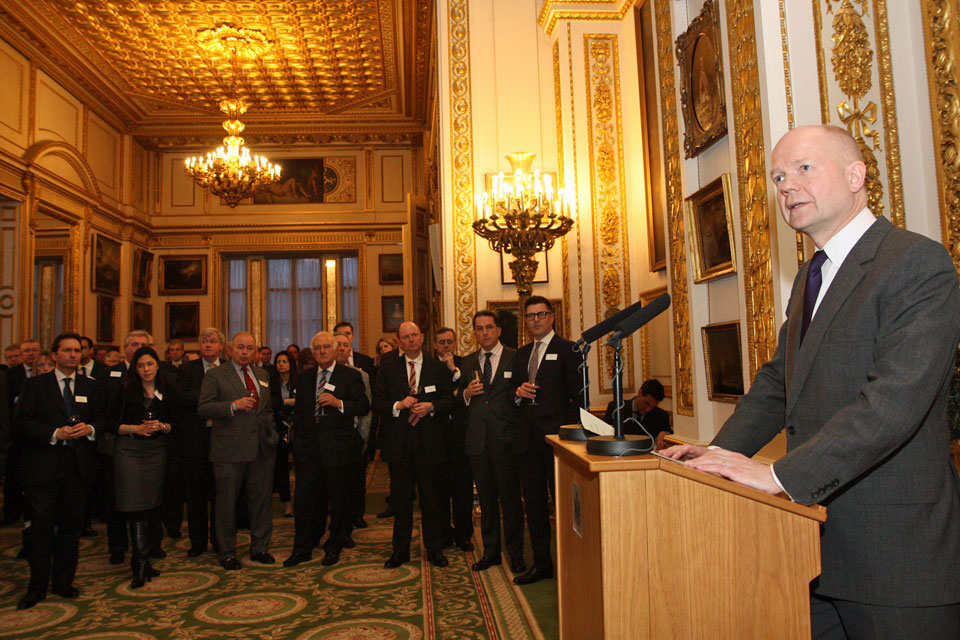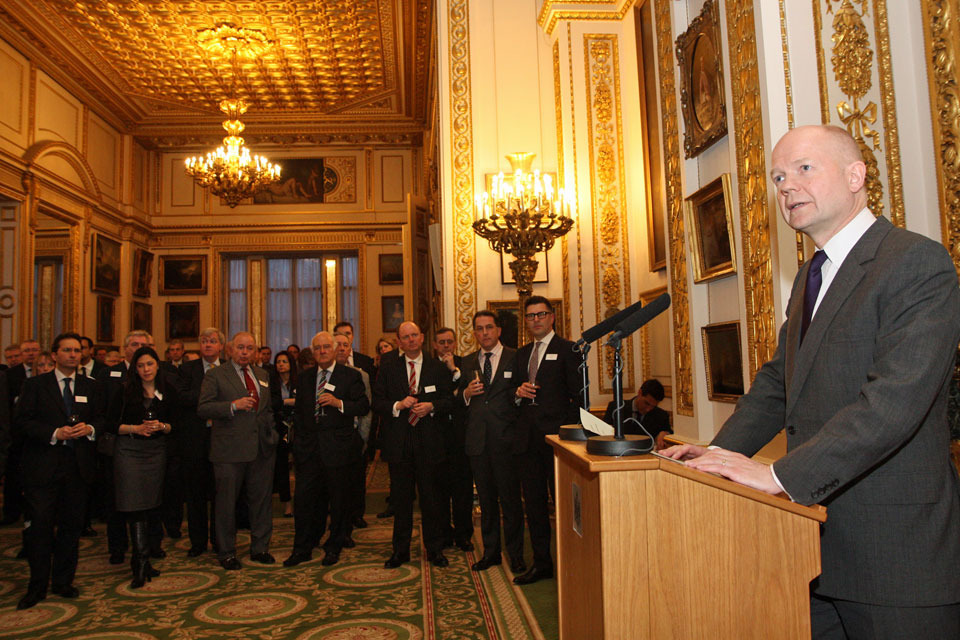EU - US Free Trade Agreement
The Foreign Secretary spoke at at a reception for the business community about the benefits of a EU-US free trade agreement.

The Foreign Secretary William Hague said:
Good evening ladies and gentlemen and welcome to Lancaster House. This Reception comes at the start of what I hope will be a successful but obviously challenging journey towards the historic prize of a transatlantic trade agreement, and I am particularly pleased that so many leaders from the business community are able to join us - as it is essential that we listen and understand your priorities before the negotiations with the United States begin. Senior officials from the FCO, UKTI and BIS are here so please give your opinions to them in order for us to be able to understand your priorities.
We are still grappling with the effects of the biggest economic crisis since the Great Depression, and there are significant challenges that all European economies must overcome before they can return to the path of sustainable and long-term economic growth. But that growth has to be built on the strong foundation of expanding trade, and not a mountain of debt.
So we need a competitive and open European market, one that attracts significant overseas investment and is committed to free and fair trade. The conclusion of ambitious trade agreements that unlock commerce, jobs and investment are vital to that process.
Since the 18th Century, this country has been leading the fight for free trade across the globe. From Adam Smith’s Wealth of Nations and the repeal of the Corn Laws, to Bretton Woods and the completion of the European Single Market, we have been at the forefront for most of the last 250 years in calling for the removal of trade barriers. Our argument is simple: open markets mean that people can sell their products to the highest bidder. By reducing tariffs, subsidies and quotas, and making sure that regulations are kept to a minimum, you can improve the lives of billions of people now, including those in developing countries.
And the conclusion of a Transatlantic Trade and Investment Partnership would be the biggest possible milestone in the progress to a more open global trading system.
Now of course we have a mountain to climb. Previous efforts between the EU and US Administrations have failed: President Clinton’s New Transatlantic Agenda was swept aside by pressing security issues in the Balkans; President Bush’s Transatlantic Economic Council has been weighed down by technical disputes.
But an agreement has never been so necessary, or as achievable, as it is now. National leaders on both sides want it, CEOs of major companies are calling for it, and the people of America and the EU need it more than ever. And if this moment is not seized, then it could pass quickly and not be seen again for a generation.
We need to work hard to ensure that this opportunity is not lost, as the benefits of an agreement between the world’s two largest economies, which account for half of global GDP and almost a third of global trade, are too big to ignore:
First, a successful agreement should add over £100bn a year to the economies of the EU, secure millions of jobs on both sides of the Atlantic, and give a much needed boost to global growth.
Although the UK and Britain alone have almost one trillion dollars invested in each other’s economies, supporting over 1 million jobs in both countries, we should not underestimate the obstacles that some British businesses face when trying to enter the US market. This is especially true for those that operate in sectors where the states set the rules. And so each barrier removed will help British companies export more goods and services to America.
Second, an ambitious agreement would also send a powerful message to the rest of the world that we are willing to show leadership on trade liberalisation and to shape global economic governance in line with our values. We could agree common standards and rules fit for the 21st century - particularly in new and emerging areas such as online intellectual property – and these would set an example that could inspire others to follow, generating much needed momentum for broader trade liberalisation around the world.
Third, a trade deal with the United States would be a step towards demonstrating that the EU is relentlessly focused on delivering prosperity for its people, and responding to what they need the most: jobs and growth. It would also show that the collective weight of the EU enables us to negotiate trade deals that bring benefits to British people, thereby contributing to a more positive achievement of the EU in this country.
And finally, a Trading Partnership would reinvigorate the historic transatlantic ties and put the EU’s relationship with the United States on a more modern footing, one that is fit for this Century. We have always had close trading relations, but a proper agreement that integrates our markets further and is ambitious in scope would show that the relationship is capable of adapting to the most urgent needs of our people.
There will be significant obstacles along the way, such as agriculture, and the convergence of standards and regulations. But we have comparable markets and should be able to trust each other’s rules and standards.
Now is the best chance to reach a deal, and we must sustain the current political momentum, work hard to overcome our differences, and take bold decisions. This Government will do everything we can to ensure a successful outcome. Our diplomatic network across the US and Europe will be lobbying and negotiating, and the promotion of trade is one of the main objectives of our G8 Presidency, which we will use to build even greater momentum.
We also want the business community in the UK to be as involved as possible. An agreement will only be good for Britain if it is good for British business. So tell us what would be in your interests; what would benefit you the most; and we will work hard to meet those needs.
We need an agreement that removes shackles of regulation and eliminates unnecessary barriers to trade, injects energy into the British and European economies at a critical time. This would be a historic and transformative deal, one that shows the world that the EU and US are serious about opening markets and liberating business, and could provide an impetus for new free trade initiatives worldwide. We need to work together to grasp this opportunity. If we concentrate our effort, overcome obstacles, and focus on the end goal, then I am confident that we will succeed.

Foreign Secretary William Hague speaking at the EU-US Free Trade Agreement reception in London.